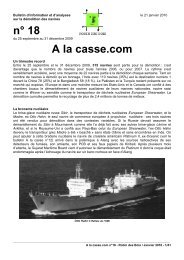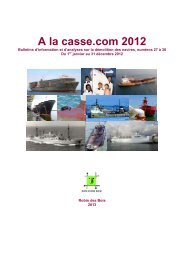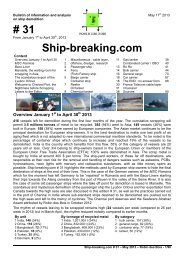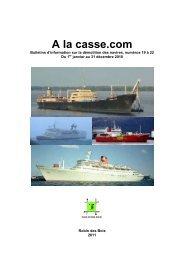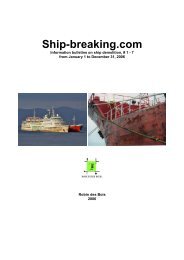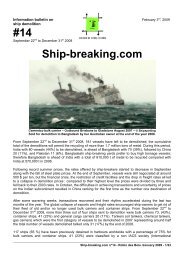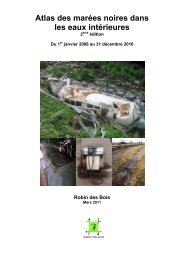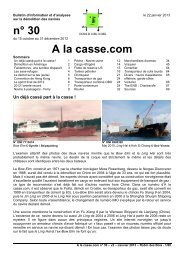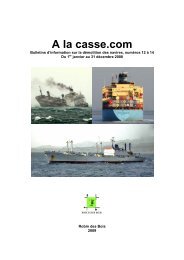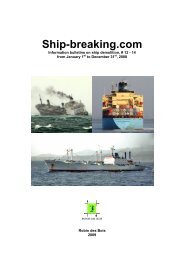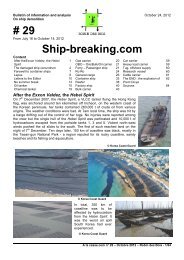Ship-breaking.com - Robin des Bois
Ship-breaking.com - Robin des Bois
Ship-breaking.com - Robin des Bois
You also want an ePaper? Increase the reach of your titles
YUMPU automatically turns print PDFs into web optimized ePapers that Google loves.
Global statement 2010 of vessels sent to demolition :<br />
For five years, <strong>Robin</strong> <strong>des</strong> bois has been studying the demolition market via the mobilisation and the<br />
analysis of over thirty different bibliographical sources. In 2006, <strong>Robin</strong> <strong>des</strong> <strong>Bois</strong> counted 293 vessels<br />
sold to be demolished, the majority to be broken up in Bangla<strong>des</strong>h (57%), in India (26%) and towards an<br />
unknown <strong>des</strong>tination (7%). In 2010, a total of 952 vessels have left the waters to be scrapped in India<br />
(44%), in Turkey (14%), in China (13%), in Bangla<strong>des</strong>h (11%) and in Pakistan (10%). The total weight of<br />
recycled metal has gone from 1.8 million tons in 2006 to more than 6.4 million tons in 2010, almost<br />
four times the total amount of 2006.<br />
In 2010, the prices offered by Asian shipyards have regularly increased and is around 440 and 500 $ per<br />
ton. Even Turkey profited from an increase in prices which could reach up to 300$. In spite of the boom<br />
in the number of vessels, the amount totals more than the end of 2006 when the two leaders of the<br />
market, Bangla<strong>des</strong>h and India, offered between 400 and 450$, China 250$ and Turkey less than 200 $.<br />
After the record <strong>breaking</strong> year of 2009 with a total of 1,006 vessels, the influx was only 5%. The rhythm<br />
of the vessels leaving the oceans has remained regular and stable throughout the year. The impacts of<br />
the worldwide financial crisis on <strong>com</strong>mercial exchanges decreased, container ships and car carriers<br />
have resumed activity and have be<strong>com</strong>e rare in ship-<strong>breaking</strong> yards.<br />
In 2010, for the third consecutive year India is the number one <strong>des</strong>tination for demolition with a total of<br />
417 vessels (44%). Turkey <strong>com</strong>es second with 136 vessels (14%) yet closely followed by China with 124<br />
vessels (13%). Bangla<strong>des</strong>h <strong>com</strong>es in fourth place with 103 vessels (11%); Bangla<strong>des</strong>h was absent for<br />
half of the year; the certification protocol of their shipyards today remains unclear and the fight is still<br />
raging between on one side the Courts and environmentalists and on the other side the ship-<strong>breaking</strong><br />
yards. Other vessels finished their careers in Pakistan (91), United States (11), Denmark (6), Belgium<br />
(4), Japan (1) and even Peru (1).<br />
Turkey is the up<strong>com</strong>ing star of the year with a tripling of the number of vessels demolished thanks to the<br />
rationalisation of synergies steel industry / demolition and the improvement of dry demolition practices<br />
with the collection of liquid wastes and the setting up of booms to protect the ocean from pollution.<br />
The United States are quite hypocritical with the demolition of the Reserve Fleet veterans and a fistful of<br />
tankers and container ships from the <strong>com</strong>mercial fleet in Texan and Louisianan ship-<strong>breaking</strong> yards. This<br />
practice viewed as exemplary is practically contradicted by the exodus of a troop of – lately deflagged,<br />
quickly renamed, botchily disamericanised – American vessels towards Asia. The demolition of these<br />
vessels in Asia when they were chartered by the American Military Sealift Command or belonging to oil<br />
<strong>com</strong>panies stops the field from developing in America and is contradictory to environmental laws in force<br />
in the United States.<br />
Of the 952, vessels, 367(39%) were under a European flag or belonged to ship-owners established in<br />
the European Union or members of the European Union or the European Free Trade Association<br />
(EFTA). Once again we can clearly see the ”scuttling” of the European ship demolition industry as a<br />
number of vessels including many ferries, leave Northern Europe to be demolished in Asia. However, in<br />
2010 European breakers demonstrated their capacities by finishing the demolition of the ex-<br />
Clemenceau, by the regular activity of the recycling yard in Ghent, Belgium, the reinforcement of Danish<br />
ship-<strong>breaking</strong> yards and by start of an organised network of demolishing fishing vessels in France.<br />
14 VLCC (Very Large Crude Carrier) were sent to be demolished. Amongst the vessels demolished in<br />
2010, 462 (49%) were less than 150 m in length, 322 (34%) measured between 150 and 199 m, and 168<br />
(18%) more than 200 m. The ages range from 15 to 71 years. The average age is the same as in 2006,<br />
31 years.<br />
In 2009 with 180 units, the category of oil tankers, chemical tankers and gas transporters was down<br />
graded to 4 th place of vessels sent to be demolished. In 2010, this category of vessels reclaims its rank :<br />
322 tankers all categories included, ie. 34% of vessels to be demolished. General cargo carriers (24%)<br />
have remained stable. Containers ships represent only 8% of the vessels sent to be scrapped <strong>com</strong>pared<br />
to 19% in 2009, and bulk carriers 10% <strong>com</strong>pared to 22% in 2009.<br />
The number of substandard vessels amongst the vessels leaving to be broken up is high. Out of 952<br />
vessels, at least 419 (44%) were detained in previous years with their crew in ports world-wide and in<br />
particular in Europe for not conforming to International maritime security regulations. The different<br />
memorandums mainly Paris MoU, Tokyo MoU and the Indian Ocean MoU play an important role in the<br />
fleet clean up.<br />
<strong>Ship</strong>-<strong>breaking</strong>.<strong>com</strong> # 22 - <strong>Robin</strong> <strong>des</strong> <strong>Bois</strong> / January 2011 - 36/39



